Physical Distancing With Social Solidarity!
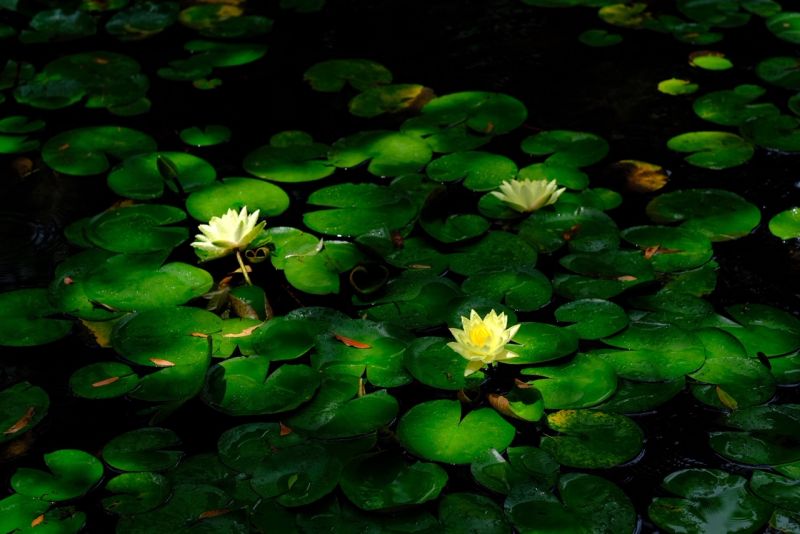
This past Tuesday, 90 of us gathered online, in response to an invitation to collectively hold the question: How Does A Heart of Service Respond To These Times?:
Coronavirus has uprooted the fabric of our lives. How does a heart of service respond to an unknown cause, how do we build resilience when we can't be physically together, and how do we amplify lotus in the mud?
Uncertain times raise significant questions that can architect a new story for our future. Carbon emissions have dropped dramatically, but xenophobia is rising. Nursing homes are being evacuated, only to bring elders home to their families. Shopping malls are empty but family meals are on the rise. Awakening of kindness is pervasive, but the inequality of human suffering is evident. Borders are still present, but the boundaries of our shared humanity are getting blurry. Yes, undercurrents of fear are everywhere, but so are prayers. Jack Kornfield recently shared, "The virus isn't happening to us; it's happening for us." May we all embrace this invitation to step into our highest aspirations and serve this inflection point in history.
There was so much to soak in during our time together. We began with a panel on medicine and resiliency -- with illuminating insights from UCSF Medical Center doctor-poet Sri Shamasunder, who began treating coronavirus patients this week; UC Berkeley Economics Prof. Clair Brown, who's the visionary behind the field of Buddhist Economics; and disaster resiliency leader Bijan Khazai, whose team in Germany has been aggregating countrywide data on the virus around the clock!
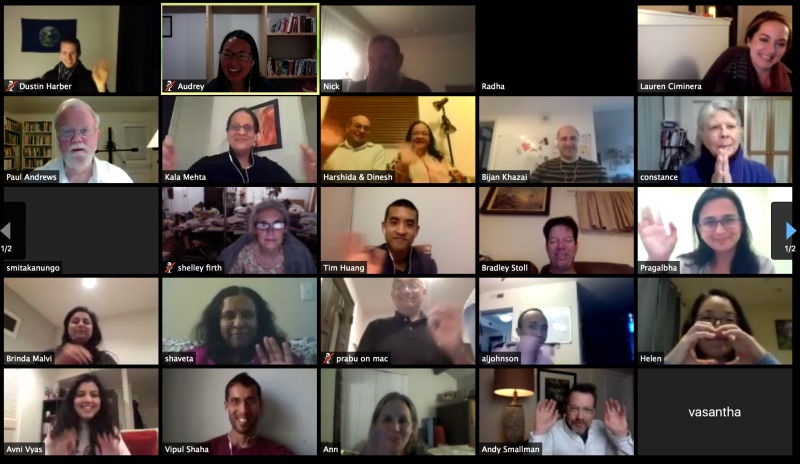
From there, we moved into breakout rooms and reflected personally in small groups how we're sitting with this pandemic. Transitioning back into the "main room", we had a round of open reflections and then steered into a closing "Wisdom Panel" with grounding perspectives from Buddhist monk, Rev Heng Sure, and interfaith minister, Bonnie Rose. With energy brimming forward into pathways of constructive action, about half of us stayed on the call after it officially concluded, to brainstorm creative possibilities to serve these times.
Below are a few questions and insights that we collectively held, and that we are collectively living into.
What Happens When Ordinary Becomes Sacred?
On Monday, Sri began working on the medical team serving coronavirus patients at UCSF Medical Center. He described, "There's going to be a closed unit on the fifteenth floor of the hospital. Right now there's only six patients that are covid positive there, but there's many more that are getting tested daily. Right now, we only have the capacity to test 80-100 patients a day. (To compare, South Korea does 20,000 tests a day. They tested 250,000 patients already.) We're slowly starting to scale up."
At the beginning of his first shift in this unit, he described:
"One of the things that was remarkable was that there was a 10AM grounding with all the emergency room doctors and all the emergency room residents. Everybody has mask on. Everyone has a shield on. There's a collective sense of purpose and commitment in the space. In a lot of places where I've worked -- in India and Liberia -- oftentimes, spirituality and religion is brought into the space. I haven't seen it that much in the US in a collective way amongst health professionals. In this setting, we went through all the potential positive patients -- what rooms they were in, what the status was of the three tents out back.
"Then, the chaplain stepped forward and he asked everybody to ground themselves. He took this moment where you could feel the energy in the room of purpose and commitment in that really beautiful way.
"He said, 'We are ordinary people called to do sacred work.'"
In that spirit, when disaster resiliency expert Bijan in Germany realized there is no centralized agency reporting Germany's coronavirus cases, his small team stepped up to collate it themselves. "In Germany there are about 300 official sources reporting COVID-19 statistics each for their own jurisdiction," he explained.
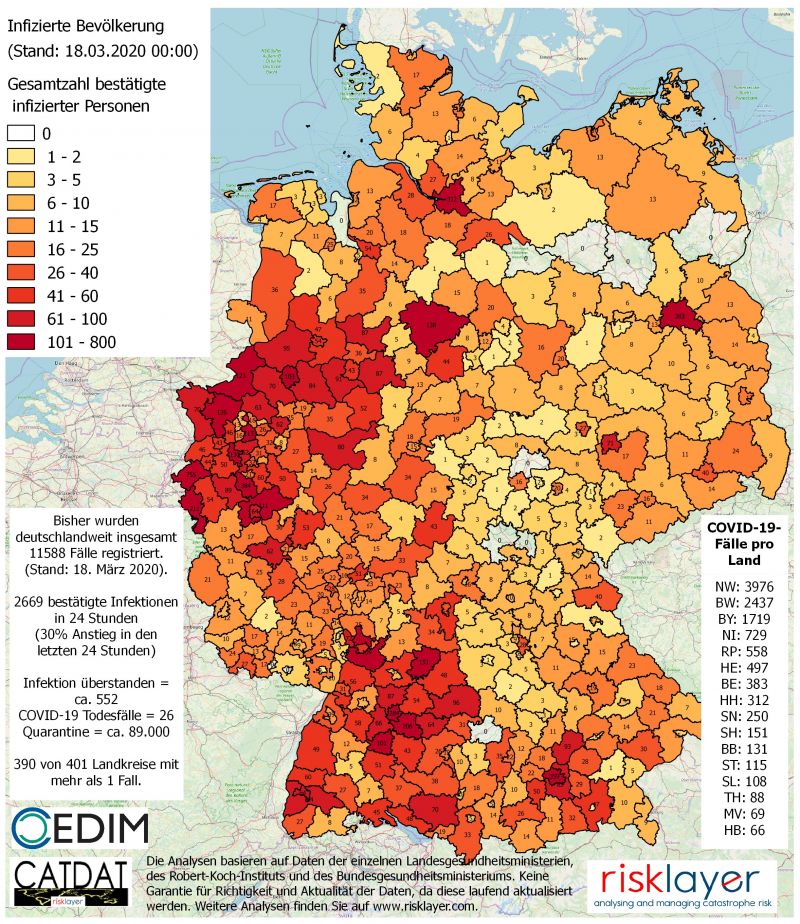 While the growing rate of cases are sobering (going up from 7,182 to 11,051 cases that very day, and at the time I write this, it's reached 18,257), the effort and context has made this ordinary act of calculating statistics a sacred service to humanity.
While the growing rate of cases are sobering (going up from 7,182 to 11,051 cases that very day, and at the time I write this, it's reached 18,257), the effort and context has made this ordinary act of calculating statistics a sacred service to humanity.As Bijan's team posted the numbers online -- an organic crowdsourced effort has emerged, where twitter followers jump in to review and send data. A mapping company offered free use of their software to map and share the data visually, and news agencies broadcast the shared data.
Can Times Of Social Distancing Bring Us Closer Together?
On a systemic level, Bijan noted, "How long can maintain these type of deep-cutting interventions that are bound to have many indirect effects (the economic vs. public health equation)? Will the disease quickly spread again once the supersession measures are lifted?"
Faced with no solid answers, the question he is left with is how to help others: "How do we as a society collectively care for and serve the elderly and high risk population? Despite social distancing, how can we build heart connections and serve in simple ways? With these creative constraints, what can we as a community give rise to?"
.jpg)
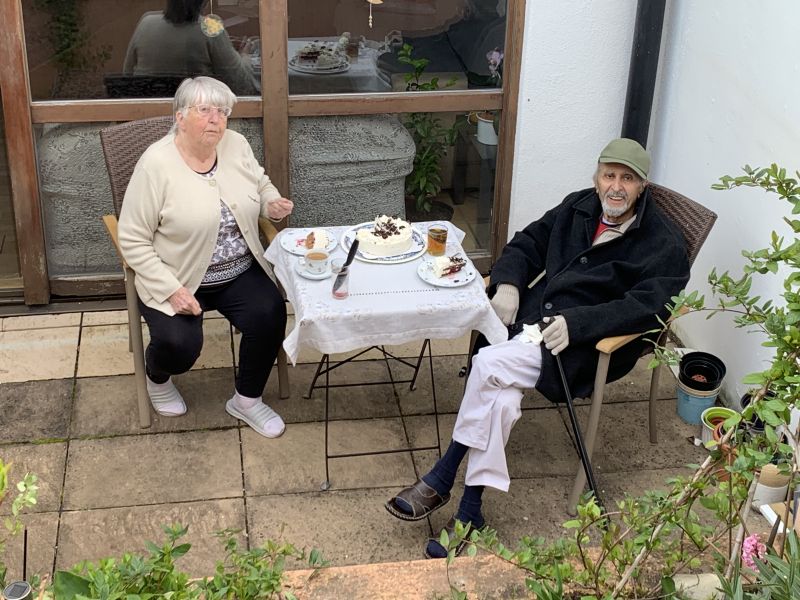
Incidentally, that day happened to be his parents 51st wedding anniversary. His family lives upstairs from them, and these days, they chat on the balcony while he sits a safe distance away.
"Normally we would have had a big celebration for their anniversay, but we are so fortunate to have each other. Strangely enough, these times of physical separation have brought us closer together and reminds us all how much we need each other."
In a breakout session, Prabhu echoed a similar sentiment, amid his region's Shelter-In-Place orders. "This is a time we are able to come together as a family. I feel blessed for that."
How Do We Hold Suffering With A Mind Towards Awakening?
"Pandemics are this great foregrounding of universal suffering that is part of existence," Sri remarked. "At the end of life, with patients who are suffering, you're dealing with mortality in an individual way. In this sweeping way of a pandemic, it's actually drawing the collective sense of what it is to be mortal -- and what it is to suffer -- to the front of everyone's mind."
"It is such a narrow way that we walk," Bonnie described, "of knowing that life is precious, but also knowing that we can't cling to it."
She offered: "Sacred people can become ordinary. To me, that means that we're being drawn down into our commonality and into our humility. We're all wrestling with impermanence -- the fact that life is fleeting. We're wrestling with uncertainty because we really, really want to know how things turn out. ... We do things ... to avoid our vulnerabilities. The vulnerabilities that life is uncertain. Yet at the same time, there's a perfection to it. There's a perfection to impermanence, because it makes That Which Is so much more precious."
How can we cultivate the inner capacities -- the intangible resources -- to sit with That Which Is? To root ourselves in eternal values rather than narratives of false solidity? To act from a space of love over fear? To respond with a heart of service?
Along those lines, Pankaj echoed the importance of honoring this liminal space. "For each of us as individuals, it’s critical for us to see this as a transition phase that offers an opportunity. To appreciate the moment for what it is right now, and let it soak in, in a manner which will inform what comes next. Allow for that liminal space."
In that process, Rev Heng Sure described:
"There is a kind of giving that the ancients have always praised, which is the giving of insight or princple (or "dharma" in Buddhism). Here's one for us, facing the coronavirus: It hurts. This is painful. Change is painful, but when change involves cutting our social fabric -- when change involves facing fear -- that's painful.
"Someone said: "The nature of a world where things come together is that things come apart." Everything that is made of conditions of phenomena will at some point, be unmade by those very same phenomena. And we hurt in the process to the degree that we don't want it to change -- through the degree we resist or deny or fear it.
"Can we look straight into the face of this virus and say, "This is frustrating. This is stressful. This is frightening. This is the nature of the world."
How Can We Give? What Is Our Innate Wealth?
With our usual operations closed to slow the spread of the virus, our most obvious modes of giving -- of material, physical presence, even a shared meal or a night on the town -- have suddenly been evaporated as orders to shelter-at-home, self-isolate or put cities and countries on lockdown become our new reality.
Rev Heng Sure echoed what we all were wondering: "What can you do to affect the whole, when you are behind your own door?" At the start of the call, Clair remarked, "To people who are engaged and wanting to do service, sheltering-in-place is the biggest challenge I've ever had."
Yet perspective after perspective unearthed treasures hidden in plain sight.
Bonnie quoted these lines by Jamie Tworkowski:
Conversations will not be canceled.
Relationships will not be canceled.
Love self-care will not be canceled.
Hope will not be canceled.
Reading will not be canceled.
May we lean into the good stuff that remains.
She further offered: "A virus is this little tiny, tiny thing that can wreak havoc and do so much to humanity. What if kindness if viral? What if love is viral? What if we give that love as much vital energy and power as we're giving to coronavirus. Because beyond all of the impermanence, I think there is this permanent condition called love and hope."
What Is The Opportunity Of This Pandemic? Can We Find The Gifts In Coronavirus?
Preeta wondered, "When the crisis abates, what forms of value can we as a community offer to communities?"
This situation has halted our systems, which, in the face of mortality, fall short of providing a sense of meaning or peace in the circumstances. With commerce and travel derailed to a slow drift, what economy will rise in the wake of this outbreak? With schools out of session for the rest of the academic year, what does education look like? With companies and organizations forced to go remote, formerly compartmentalized work-home lives are suddenly wrapped together as one. With our usual structures uprooted -- what can we do to help midwife regenerative pathways of operating going forward?
"No business contingency plans factors in a pandemic," Pratyush offered. "Most leaders find themselves in situations that they’ve never imagined let alone prepared for. Yet what's surfacing all around is: how do we take care of others first?"
Similarly, when the state legislature closed, putting her climate legislation work on hold, Clair found herself re-framing her timeframe of work to the pure present: "We are being called to shift our way of thinking to ‘what can we do right now to help people?" Not legislation for five years down, but how can we show up in this hour?
Andy, an educator in Seattle, offered a quote with a resonant invitation:
It may be the gift of this virus is to heighten the compassion with which we reach out to each other and see ourselves as part of a larger whole. What practical ways are there for you to offer help where you live?
--David Spangler
To that end, many people were shining examples of possibility. Vipul shared an open invite with friends: "I'm here to listen," which sparked a 'mindful listening space' online. Similarly, Brinda began offering a virtual meditation hour. Paul invited us all to collect stories of generosity. "There's youth teaching elderly how to use the internet. There's so many incredible things happening," he reminded us. On the level of subtle matter, Radha offered: "What is the role of prayer?" Xiao is hosting a 21-day "Coronavirus Challenge" with her community, to foster connection and self-cultivation. Avni wondered about creating a buddy system between youth and elders. Just after our call, Prabhu and Lakshmi wrote up highlights from the conversation to offer as inspiration and resource to friends. Pankaj sent an email offering support to his neighborhood, to which many echoed his spirit of offering. And the goodwill continues to circulate.
Will This Pandemic Be A Turning Point? Can This Be A Shift Towards Global Solidarity?
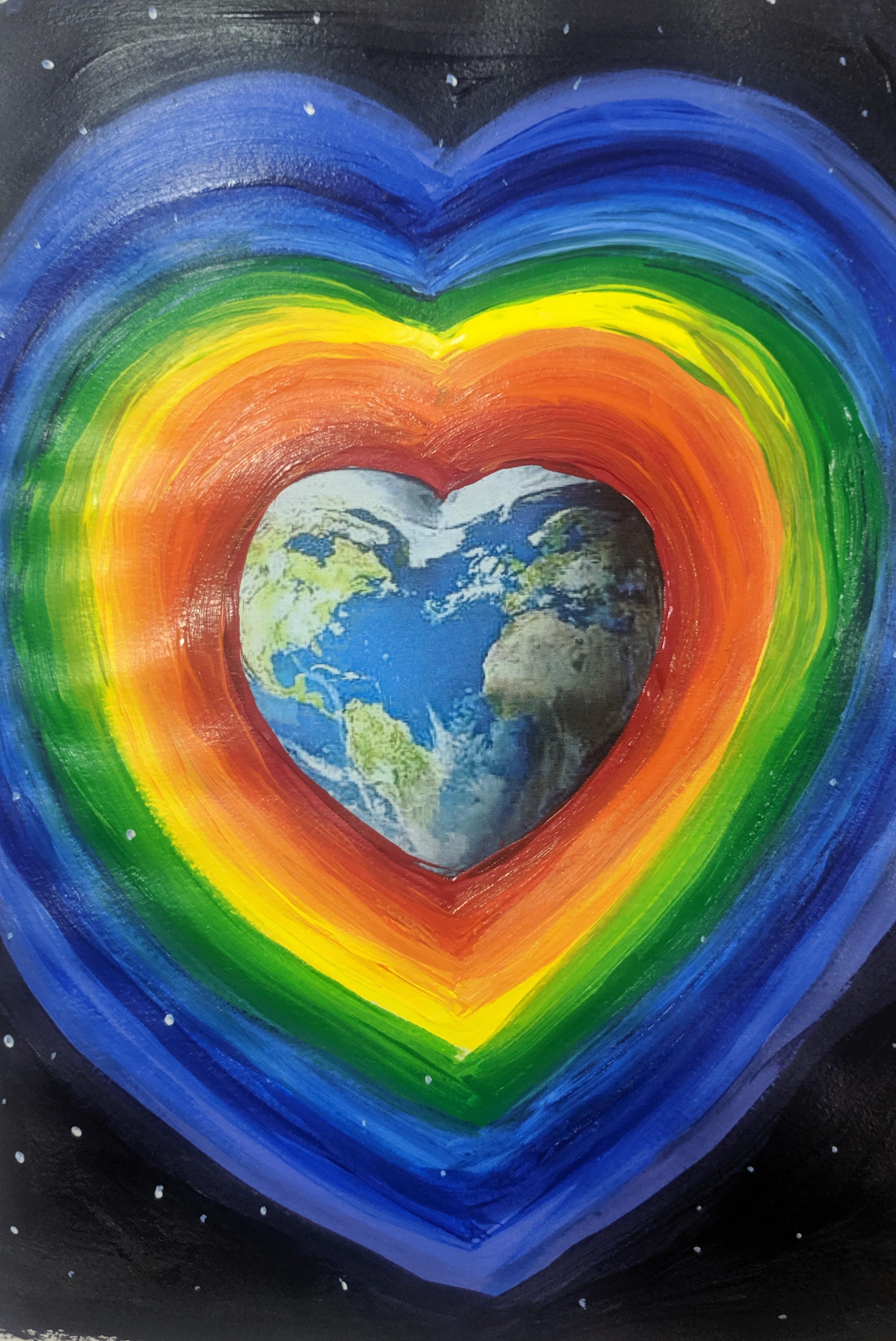 Sri observed: "In disasters, we know that the collective purpose and the collective sense of solidarity elevates. Can this pandemic be a turning point for humanity? I remember reading about Dorothy Day, the great Catholic social activist, after the 1906 earthquake in San Francisco. She was about 9 years old, and she recalled walking around, and seeing so much compassion and kindness right after the fires. Her entire life of social activism was about trying to recreate that energy, and that spirit of service. I was a first-year med student after 9/11, and for about two weeks right after, it felt like everyone had committed to the collective in a really beautiful way. In this pandemic, I think we've started to see that in some ways, small and large. Can this be a turning point of global solidarity?"
Sri observed: "In disasters, we know that the collective purpose and the collective sense of solidarity elevates. Can this pandemic be a turning point for humanity? I remember reading about Dorothy Day, the great Catholic social activist, after the 1906 earthquake in San Francisco. She was about 9 years old, and she recalled walking around, and seeing so much compassion and kindness right after the fires. Her entire life of social activism was about trying to recreate that energy, and that spirit of service. I was a first-year med student after 9/11, and for about two weeks right after, it felt like everyone had committed to the collective in a really beautiful way. In this pandemic, I think we've started to see that in some ways, small and large. Can this be a turning point of global solidarity?"Nick noted, "What’s going more viral than this virus is that I’m sensing and feeling a positive coming together. I really sense in my being that there’s a global wakeup call here. I'm seeing people coming into their true nature; the raw spirit of humanity."
In the perspectives shared and the togetherness on the call, the sense of collective spirit buoyed our sense of possibility. Amidst the now-ubiquitous refrain of "social distancing," Kala amended the phrase:
"It's not not 'social distancing'. It's physical distancing with social solidarity."
While we are physically apart, this pandemic seems to be bringing all us together more than ever before. By the end of our time together, there was an energy brimming across our screens. :) We couldn't help but feel the incredible wealth that our collective goodwill had surfaced.
After our two hours together, it's clearly the beginning of so much more.
----
[After the conversation, a group of volunteers followed-up with the creation of a new web portal to support the times: karunavirus.org In addition, we're hosting a second global conversation on Tuesday, March 31st @8AM PST -- Details/RSVP here.]
Posted by Helen Kimura on Mar 21, 2020
SHARE YOUR REFLECTION
20 Past Reflections


On Mar 22, 2020 Sally Mahe wrote:
I wasn’t on call. I found this summary deeply inspiring.
There is a phrase we returned to often in URI, “we are being what we want to become.†This call was a living into the ideas and comments people made. So forwarding to be among people from different backgrounds. Yes, a world of loving service is possible. This call makes that possibility more real.
There is a phrase we returned to often in URI, “we are being what we want to become.†This call was a living into the ideas and comments people made. So forwarding to be among people from different backgrounds. Yes, a world of loving service is possible. This call makes that possibility more real.

On Mar 26, 2020 Srinivasan wrote:
Please use physical distancing instead of social distancing.
Social distancing:
ðŸ§ðŸ»â€â™‚ï¸ ðŸ§ðŸ»â€â™€ï¸ ðŸ§ðŸ½ ðŸ§ðŸ»â€â™€ï¸
Untouchability:
ðŸ§ðŸ½ðŸ§ðŸ»â€â™€ï¸ðŸ§ðŸ½ ðŸ§ðŸ»â€â™€ï¸#kjshikhar
Social distancing:
ðŸ§ðŸ»â€â™‚ï¸ ðŸ§ðŸ»â€â™€ï¸ ðŸ§ðŸ½ ðŸ§ðŸ»â€â™€ï¸
Untouchability:
ðŸ§ðŸ½ðŸ§ðŸ»â€â™€ï¸ðŸ§ðŸ½ ðŸ§ðŸ»â€â™€ï¸#kjshikhar

On Mar 26, 2020 Barb wrote:
What a dose of antibodies! I feel healthier and more committed already. So grateful. And how wondrous that all the years of practice and dynamic compassion offered by this space has come to bring these reflections at this moment to us.

On Mar 26, 2020 Deborah McKinley wrote:
Thank you Rev Heng Sure for such clarity & wisdom.


On Mar 26, 2020 ElizaBeth wrote:
I see things happening in my local community and in the Sangha I am a member of which to date has not occurred. We remain open to closeness,care, compassion evolving as the space changes shape, and as the narrow stronghold we were all driven by ...changes daily. I hold faith in this "unknown" that between us we emerge in to a different place unimagined through our previous lifelong glasses

On Mar 26, 2020 Lee Ann Duncan wrote:
This is an opportunistic time for us to shift our perspective from nationalism to globalism. For once, there is no "other" to blame and go start a war with or sanction to yield power. May there be transformation for the individual and the collective in both big and small matters. Thank you for this summary - it's full of wisdom nuggets.

On Mar 26, 2020 Patrick Watters wrote:
Beautiful and encouraging, thank you all! ðŸ™ðŸ½

On Mar 26, 2020 Marie wrote:
Faith, generosity & kindness our most untapped natural resources.

On Mar 26, 2020 Lisa Fitzhugh wrote:
so much in just two hours! thank you all for sharing your gathering with those of us in other places. How would I find out about joining this forum?

On Mar 26, 2020 Sahara wrote:
So elevating and heartwarming to hear from these great people out there ...Sending you heartfelt gratitude ,love and multiple hugs!! Smiles smiles smiles and smiles

On Mar 26, 2020 Rajalakshmi Sriram wrote:
It is wonderful to relive the virtual meeting tt hrough this write up. Thanks for such deligent transcription and write up, that brings foth beautifully the entire experience. So grateful for this. Look forward to 31st..for the next meeting


On Mar 26, 2020 MaryAnne CALEO wrote:
It is so helpful to read these wonderfully positive ways of dealing with this unprecedented time! Thank you
You have given me the words which help!
You have given me the words which help!

On Mar 26, 2020 Kristin Pedemonti wrote:
Thank you. I feel this deep coming together as well, so many acts of kindness, love, compassion and caring gives me hope that many more are awakening.
I am also doing my part, reaching out daily to those who are in fear or are lonely. And Ive been sharing Free Storytelling and also uplifting Tell Me Something Good Tuesday every Tuesday + offering online sessions for free and Pay What You Can of tools to reduce anxiety and feel more at ease. ♡
It's already feeling so heart centered.
Big love to all of you for doing your part in sharing heart.
Together we make it through♡
I am also doing my part, reaching out daily to those who are in fear or are lonely. And Ive been sharing Free Storytelling and also uplifting Tell Me Something Good Tuesday every Tuesday + offering online sessions for free and Pay What You Can of tools to reduce anxiety and feel more at ease. ♡
It's already feeling so heart centered.
Big love to all of you for doing your part in sharing heart.
Together we make it through♡

On Apr 4, 2020 Kimberly Walker wrote:
I'm always at awe at how the universe holds a common thought within a collective breath. And in the hearts of those whose mind can hear it's beat a vision for sharing it's voice arises. What was breathed in this gathering is breathtakingly beautiful. And it gave words to what has been rising in my heart, "How do I serve in this liminal space?" Thank you.

On May 30, 2023 BryanDum wrote:
Из представленного нами каталога оптовых поставщиков товаров для дома Вы выбираете тех, кто заинтересовал Вас https://пром-мир.рф/wp-content/uploads/2022/04/1a23cc9346f28558211402db0427dba7.jpg
Нажатием одной кнопки начинаете загрузку необходимой информации https://пром-мир.рф/wp-content/uploads/2022/04/6b6681eb_b27a_11eb_95c8_40f2e9da4fe5_0c89b347_ba56_11eb_95ca_40f2e9da4fe5.resize1.jpg
При необходимости оплатить тариф сайт известит об этом https://пром-мир.рф/wp-content/uploads/2022/04/932564.jpg
Автоматическая загрузка наполни [...]... [View Full Comment]

On May 30, 2023 Petergog wrote:
Спасибо огромное всем!! и если у Вас действительно есть проблемы, которые Вам помогали решать чудо-доктора из частных клиник (которых сейчас так много – что и не перечислишь), но вы все ещё все в - советую не откладывать визит к доктору!

On May 30, 2023 Wesleyset wrote:
ОПИСАНИЕ ИЗОБРЕТЕНИЯ К ПАТЕНТУ (12) РЕСПУБЛИКА БЕЛАРУСЬ НАЦИОНАЛЬНЫЙ ЦЕНТР ИНТЕЛЛЕКТУАЛЬНОЙ СОБСТВЕННОСТИ (19) BY (11) 16946 (13) C1 (46) 2013 https://пищевоеоборудование.рф/katalog/mashina-mojki/mashina-mojki-ryby-orehov-mm-2000
04 https://пищевоеоборудование.рф/katalog/defroster-vodyanoj-dvg-1000/mashina-mojki-banki-s-obduvom-mmbo-2000
30 (51) МПК C 12M 1/02 C 12M 1/04 (2006 https://пищевоеоборудование.рф/katalog/oprokidyvateli-kontejnerov-i-telezhek/oprokidyvatel-cepnoj-orc-3000
01) (2006 https://пищевоеоборудование.рф/katalog/konvejera-z-obraznye/konvejer-fasovki-produkcii-v-banku-kfb-3
01) (54)
� [...]... [View Full Comment]


On Mar 20, 2020 Brinda Govindan wrote:
Love you all,
Brinda
Post Your Reply